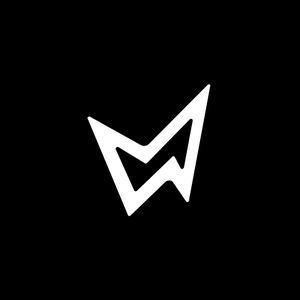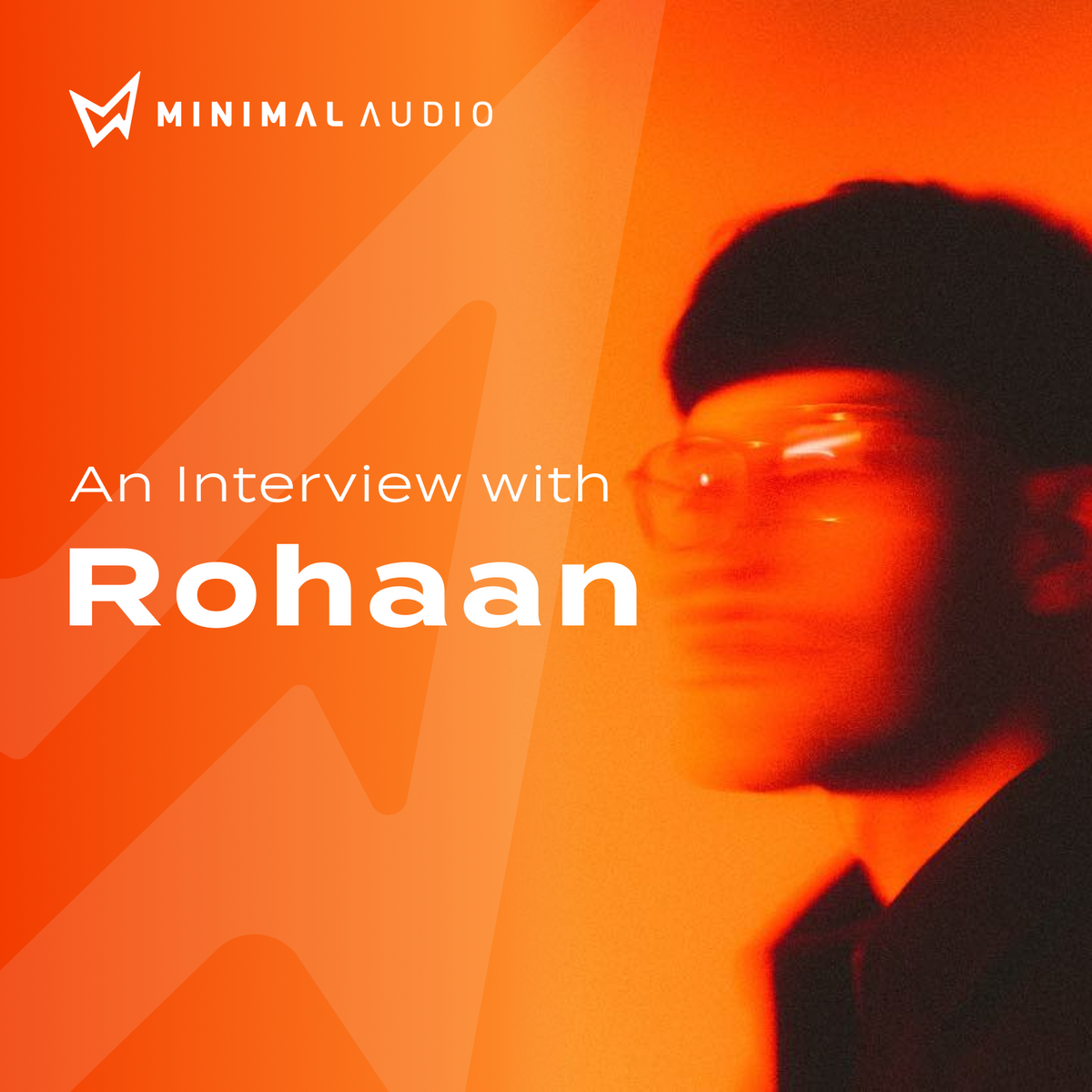Hey what's up everybody, it's Jake T. with Minimal Audio and our blog is back with another interview. This week we're talking to one of the most exciting new voices in drum and bass currently inhabiting the scene. Rohaan has proven himself a prolific producer with an array of releases on Mad Zoo, Hard Records, Deadbeats, and more! There are few emerging artists whose movements generate as much excitement. Together we sat down for a wide-ranging interview that touches on his story, his process, and what looms on his artistic horizon.
Rohaan: Boom.
Minimal Audio: Awesome, how's your day going?
RO: Doing good, man. Yeah, like I was just saying, I've, uh, I'm currently packing to move, so we have a lovely house here., but it's just the end of our tenancy., so we're just looking to move elsewhere now. So yeah, just in the middle of doing that, I've just done a mix today.
I'm also editing a vlog because I'm gonna start vlogging, which is fun. So, all exciting stuff, man.
MA: Sounds great, have you gotten a chance to try a fuse compressor?
RO: Absolutely, man. Unbelievable. So, the only compressors I normally use are the Ableton Glue Compressor, and then the Multi-Band compressor…like the stock Ableton ones, that is all I ever use. And they kind of just do the job for me. I've never really needed to push further than that. I mean, my music's quite dynamic as it is. It's not very, Traditionally slammed like drum bass usually is. So I've not tended to have to go too crazy with compressors.
But the fuse one's been really fun because what I've been doing is I've been putting it on, bass' or even just melodic elements that have little like reverb tails or little delay, just little things going on in between. All the important transients. And I've just been clicking through the presets and it's been so fun. Melodies enter a brand new world. So that's where I've been using it recently. It's just like really slamming and it's pulling out all these nice little nuances.
MA: I love that. That's great.
RO: It's been really fun because I just don't tend to use compressors, but I'm using Fuse more creatively like, there's kind of no thoughts. I'm just clicking around and it's sounding great. It's been really cool. One thing I liked about it as well, and something that I do quite a lot, is I just like how nice and obvious the dry/wet input is. And I like how that's consistent across all your plugins. That's just something that I automate a lot. In basically everything. So I just enjoyed that it's a bar and I know that's a very simple thing, but I like the UI. It's quite nice.
MA: Are there any other minimal audio plugins that you enjoy or,
RO: The main ones I've been using are Morph EQ and Rift. Cluster Delay, I haven't got around to properly using it just yet, but I know I'm gonna have a lot of fun with that.
I'm making an EP right now and the whole point of the EP is like, no thoughts. I'm just making stuff. So cluster delays going to come in that, but Morph EQ has been unbelievable. There's one setting that I've been using quite a lot which is flip-flop. And I've been able to get these crazy, like vowel bases out of it.
So that's been really cool. Posij and I have a collab and we've been using the Morph EQ a lot on it.
MA: That's so exciting! What would you say you look for in a VST? What draws you in? What keeps you using it?
RO: Uh, being able to have a randomized function is the most important thing that I look for because I want to be surprised. I want to be able to click stuff and to be like, oh, that's cool. I try to write with intention but with the intention of being surprised. I discovered today you have a randomized function that will randomly select a preset on the plugins and I did it today with Rift. I had a bass and I was like, I want this bass to sound a bit cooler. And I just was like, oh, wouldn't it be cool if I could just randomize it? So that's a big one for me.
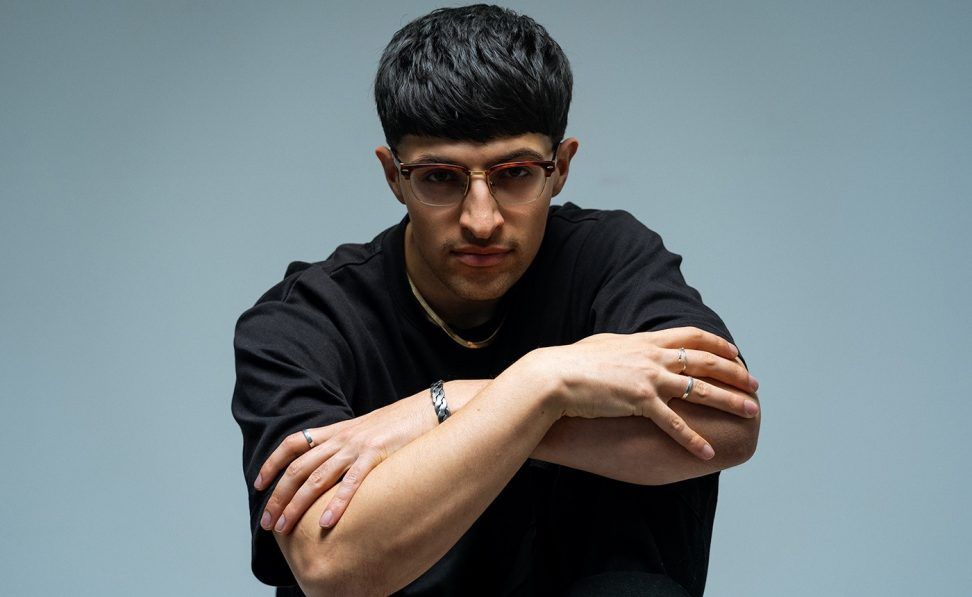
MA: That's really sick. I love that. I saw that you were posting some teasers yesterday on your Instagram. Is that the EP you're working on? Can you tell us a little bit about that?
RO: Yeah it is the EP, it’s nowhere near done or ready to be released, but what I'll do is, really far out from any sort of project launch, I'll start to narrow down. And start to change the way I speak and start to put little feelers out, getting closer and closer and closer towards that release.
It's just to spark that momentum. It sparks that momentum and interest and slowly brings them down the funnel. But yeah, that's way far off.
In terms of branding and new music coming out, I've got a Nite Punk remix. And then I've also actually just submitted a Bali-funk tune with this crazy vocalist. She's like an eight-time Grammy-nominated vocalist called Jay Lauren. So that's really exciting.
MA: Wow I can't wait to hear both of those projects, that sounds so sick. I've noticed through your catalog you have a lot of these stylistic shifts over a relatively short period. I was wondering what pushes you towards that. Is there anything else you want to do that we haven't heard yet? What keeps driving you towards these new shades in your palette?
RO: Hmm. Yeah, it's a good question, man. And I think it's just moments in time. The main thing is it's just how I'm feeling at the time, what represents me sonically. I also, actually don't listen to any drum and bass, so the stuff that I make is coming from the palette that I do listen to. That's predominantly everything from Caribou to Bonobo, Fourtet, Leon Vynehall, and everything like that. What's nice is that the drum and bass that I do listen to is my friend's drum bass. It's all like the Caracal Project, Imanu, Bunshin. It's all my friend's music.
So in terms of switching stylistically quite a lot. It's just a moment in time of what I've been listening to how I'm developing as a person and just what I'm able to, and what I feel I'm making at the time. I'm just going further down in my cave. Over time stylistically it'll probably get more refined.
Visually, the branding and the way I communicate will probably get more refined. And that's what's happening. My next project is similar to my Bleach LP, but just going further down that rabbit hole again. Press shots of me in the countryside. Everything will have like a little glow to it.
MA: Awesome. That's sick, I loved Bleach LP,
RO: I appreciate it, man.
MA: I was reading in an interview with UKF that you were saying you wanted to first experience drum and bass solely as a consumer, and I was wondering if you could expand a little bit on that.
RO: Yeah, for a long time I didn't make drum bass because I knew as soon as I started to make it, it was gonna ruin the magic. That just tends to be the way it goes. So I was very much a consumer for a very long time, and then as soon as I started making it, lo and behold, I don't listen to it anymore.
I come very much from a DJ background and spend a lot of time in clubs, going to a lot of club nights. So I have a great understanding of how that music translates live. I then combine that with the stuff that I listen to now, and that's where we kind of get my current sound.
MA: Interesting. That's really sick. So this is kind of a nerdy fan question, but what was it like working with Flowdan?
RO: It was pretty good, man. When It came together, I had never talked to him. He'd never talked to me. The label put it together. They kind of pitched it to him.
But he was super game. We made two tracks, and Musket was just bonkers. It came in and me and my manager were losing our minds. Very excited about it. And it just came together. I started that track like a year or two years prior and it had loads of different versions and then it ended up getting Flowdan on!
And then for the promo, I went down to London to meet him. I went to his house and it was super dope. I went up to him and went to shake his hand and he batted my hand out of the way and gave me a big hug. So I was like, okay, sick, sick, sick. He's just a big, soft giant.
He’s just really, really nice. We went and got some magnums, which is this sweet wine that comes in these glass bottles, and smoked some joints and drank those and made some music. So, yeah, he's great and he is very motivated. He's a showman, an artist, and just a really good guy.
MA: That's sweet to hear. I feel like that's the best-case scenario for that kind of thing.
This question is a little more process-based, but I was wondering, can you give us an insight into the way you begin your sessions. Are there any commonalities in your productional aesthetic?
RO: Yeah, definitely. Man, it's funny. I try to push out of my general routine and I usually, I just don't get good results. It's like when sports people like to warm up in a certain way, and if they don't do it in that certain way, they have a bad session each time. It’s something like that for me. For me I find a constant, so I'll get something if it's a string, something developing, but it's like a constant, it won't move it will be one note. It could be a pad, anything as long as it's just one note. Then I'll build a sub-bass underneath that. So I've now got a sub-bass with the one note. I'll then build a melody over that. Then try and do a counter melody. I then have the hat loop that I always use just to build a rhythm, and then basically from that point, I go somewhere.
So from that point, I'll be like, okay, maybe this track is going in a more drum direction. Maybe this track is going to be more melodic, stuff like that. I might find a vocal chop now, see if that's gonna be the direction. But once I've got the constant, the sub-bass, and the sub-bass usually might be quite mid, it might have a lot of like, mid energy wouldn't necessarily be too sub, so I guess more bass and then the drums to do rhythm, and then a melody from there.
From there, I just take the track to wherever it's gonna go, but usually nine outta 10 times. It starts like that.
MA: Interesting. That's really sick. So when you are working on a track would you say you prioritize process or would you prioritize product?
RO: As in, do I prioritize the way that I make the track or do I prioritize what I think the end product will be?
MA: Yes
RO: I'd say the end product. I don't ever prioritize the way I go about it. But the end product is something I usually have in my mind before I start making a track. I'll have an emotion or maybe an image in my head, something like that. And that's where the track's gonna sit
I don't really prioritize the process as much. It's more so that there's maybe a gap in my set, or maybe there's someone's track that I've been using a lot and instead of using their track, I wanna use my own track now. So I'm gonna make a track that matches that energy.
If I'm making a story track, like I did for all my bleach stuff, I might have a story or an image in my head. I want the track to sound more along those lines.
MA: Can you expand on what a story track is for you?
RO: Hmm. Yeah. So it tends to be, and I've seen this in my discography. I seem to do a club EP and then a story EP. It's how I tend, to have gone. So it's like my Only Carbon EP, which my first ever EP was very much about AI. How it could be negative and blah, blah, blah. I was doing it from the point of view of AI and had tracks called Run Human Run. People don't think; all stuff from AI's point of view. And then the next EP was Lost Sirens. And that was just straight-up Banger Club stuff. And then after that, it was my Bleach LP which is pure story.
So like a story, one will have a theme, and the visual aspect of an EP in a release for me is actually like 60% and the sound is 40%. Like I've got to get the visual aspect right. So a story EP will very much have a running theme throughout.
I'll use different sounds. The sounds will all fit the storyline in my head. If you listen to my Bleach LP, like City of Ezra, and People of Eve, they just have like a dream-esque sort of emotion to them. So I'll tend to try and capture that in each track and bring you through them.
Whereas a club EP is just, I don't give a damn. I wanna make bangers
MA: When you first started making music, when did you get to a point where you said, okay, this isn't just a track I made; This is a Rohaan track?
RO: That just came with time. 'cause originally I was making a lot of lo-fi music and a lot of American leaning EDM music. That scene wasn't alive in the UK and it's never really blown up, but that's what I was generally making. Releasing stuff with Duke and Jones on deadbeats and stuff like that. And it was my music, but my goal was always to play shows.
It was my Bleach LP, which was my first LP where I was like, this is what I do. This is like my sound. And it was just from years of trial and error.
And finding techniques and rhythms that I enjoyed doing. I just found drum and bass at the time, so easy to do. I was like, I'm gonna do some vocal chops. Okay. Like, they're all right, but add a bass. All right, now I'm just gonna make my drums sound like drum and bass drums. I was like, oh, it's done. So yeah, it was, it was definitely a lot of trial and error, and it was also the film, Midsomer that helped shape everything for that.
It kind of just placed. All the sounds and the tempo and just that emotion just kind of solidified it all in my head. I guess that it was just all those little components and also the fundamental of it was, that it had to be for the club.
I was like, I want to play shows. That's how I'm gonna make this a full-time job. So it had to be for the show. So then I stopped making lo-fi music, I stopped making more EDM-leaning music and I turned to drum and bass. it just organically moved from there and I took everything that I would usually do in lo-fi music and the music I listened to at the time, put that all in one package. Essentially you've got drum and bass in one circle, Fourtet, Caribou, and everything I listened to in another circle. And when you put 'em together, that little crossover. People then perceive that as original, and that’s where I landed.
MA: When you're writing a track, when do you call it, like, what's the point where you're like, all right, this is ready for the club?
RO: Yeah that’s interesting, because I have quite a few students on Patreon that I do one-hour one-to-ones each month with, and I always try and get them over to the hundred percent marks. A lot of people get stuck at the 70% mark where it's just kind of Okay.
The idea's there and it's just okay. So what I'll do is I'll write the whole track so when I get to the end and I listen through and it keeps my attention, if it's not keeping my attention, I keep going. I actually try to take stuff out as opposed to adding stuff. I'm trying to get a message across as simple as I can.
So I'll do that quite a lot. And when my track is there, I've gotta start. I've got an end. And the actual layout is there. If I can listen to it and it keeps my attention, it's done. I'll just do a mix-down and then it's done. I try not to go too crazy, or else I'll just never finish music.
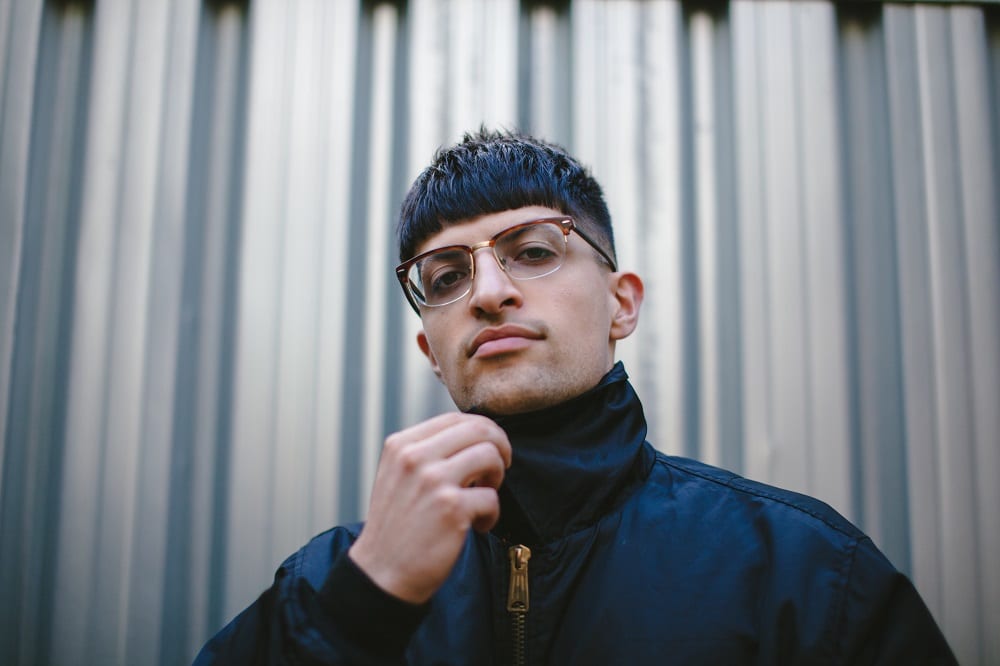
MA: What was it like getting on the UKF’s top 20 list?
RO: Yeah, it was pretty bonkers, man. That kind of changed everything for me. Like I went from like all the labels said no to my Bleach LP. No one wanted it, and then it was the last label that I sent it to, which was Mad Z00. They then replied saying, this is kind of interesting. Let's talk. We then developed it and then that came out.
And then I got the top 20 albums. I got the top 20 artists of the year. I got the “We need to talk about Rohaan” blog as well. And I also got track of the year from DJ Mag with a track that I did with my girlfriend. So it just kind of went bonkers, man. Like I was like, holy shit. And it just really moved the needle.
Like DJ Crust was playing my music out and stuff like, it just really moved the needle, which was kind of mad. I went from not no one knowing who I was, at least outside of my little bubble to then yeah to UKF flying my flag, which was cool.
MA: What do you look for in your live performances? What keeps you entertained? What is that kind of energy for you?
RO: It's just having the crowd be like, awake, man, being alive. Feeling something like there's sometimes you play for a crowd and they just don't give a damn.
They just don't care. And it's like, okay, I'm trying to have fun, but it's very hard to have fun when you're doing that. You know, it's like, I'm grateful to be here and it's wonderful that I'm able to do this, but it's very hard when the crowd gives you nothing. Whereas one of the best shows I've ever played, it's actually on YouTube.
It's my show that I did in Grogan which was the visions show, uh, groaning in, and it was just, Unbelievable man. Like the crowd would go mental, like every point of that video, there's a hands-in-the-air moment and you feed off that. And it's, really, really fun. So yeah, I'm looking for the crowd to give the energy back.
but also just a dynamic set. Like the way we consume music outside of DJing is we skip songs. Like if you listen to music on Spotify, you skip the song now and again. You may listen to music back to forward, back to forward, then you might pause a little bit. It's just how we consume stuff. You know, you need a breather.
So when I do my sets I have a few different routes. I'll either start low energy build to higher energy, come down, reverb out to nothing, and then when it goes silent, the crowd just claps. Anyway, that's kind of what we do. And then I'll just start a whole new BPM.
Just click play, just restart. And by doing that, you’re creating moments that people remember. Because most of the time when you go to see a set, you'll remember the first song and you'll remember the last song. That's basically it. There might be one moment in the middle that you'll remember. That's it. The rest of it just is deleted from your mind. So if I can restart the set every now and again, do high moments, bring it down, create big drop-offs, then you're creating more of those moments that will be checkpoints in people's minds.
MA: That's really interesting, I haven't heard it thought about like that.
RO: And it tends to work well! In America when I do shows, I'll build it up to a high point. It's at 172 BPM and then I will reverb out to silence everybody claps, and I'll kind of just have my finger up. And then I'll click play on Flowdan "Welcome to London." And his vocal comes in just like, “Welcome to London Fam” and it's just, it's sick. So yeah, I do that quite a lot. It's just a good reset, gets people excited.
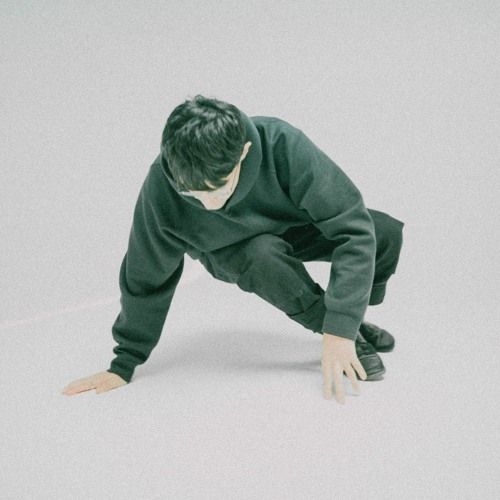
MA: What made you start your journey into music? What was that like for you?
RO: I was in the RAF cadets training to either be a pilot or a sniper because I was a really good shot. I was even considering getting laser eye surgery, all that shit. But then I went to go watch a Skrillex show with two friends and it was the mothership tour. At the LeadMill in Sheffield, it was unbelievable. And after that, I went to my mum. I was like, I'm never doing the cadets again. I wanna do what that guy was doing. She was like, right, give it a month. If you feel the same in a month; do it.
I felt the same in a month. I went back to the cadets. I handed in my outfit and I then started to study music at school. The teachers were rubbish. They were very old school in their ways. I remember showing them the Madeon Pop Culture video on the launchpad, and his response was, What's that? An easy to play piano?
And then I was like, right, I'm gonna drop out. So I dropped out, moved to Manchester, and started studying electronic music at an electronic music school. Got a scholarship for the third year and I was the first person ever there to get a scholarship for the third year. And in the third year, I decided to drop out because of the time I was spending at that school studying what I already knew. Or just random stuff, like how to use a mixing desk to record a drum kit. I was like, well, I know how to record stuff. I'll just set up a microphone and I'll work it out. But if I'm gonna spend the next three months doing this, what I could do is go get a day job and spend the next three months in Ableton.
Just working it out, working out how to make a song, you know, because I don't want to record bands, so I ended up dropping out. The school was not happy.
I got a day job in a cafe. I was making music every day. It was amazing. I was working 12-hour shifts in the cafe. I then came to a point where I decided that I didn't wanna be there anymore. The running there joke was, once you're here, you're here forever. Some people worked there for like 30 years and I was like, it's not gonna be me. So I went back to school with a marketing plan. I told them that their marketing was shocking and I could do it better. I'd never done marketing in my life, but I said I can do it better. This is how. And I had friends that did marketing, so I used to ring them every day and be like, right, I've got this question, what do I do? The school gave me a trial shift and every day I was ringing my friends saying like, I need to do this. How do I do it?
They gave me a job, so I quit the cafe, and within three months I became the marketing manager there. And when I was working there, they had all these studios. All the videos you see on my Instagram, the reels, that's all there. So I was able to utilize that loads, but on the tail end of the pandemic, they made us all redundant and I was like, fuck it, it's time.
And I went to music full-time. That's kind of story. But it all started with, yeah, going to see Skrillex live. And also I was surrounded by music a lot. My mum loves music. Like she loves Nero, she loves Chase and Status. So I was always brought up around that kind of music.
MA: As you get further into your career, what inspires you? What keeps you hungry?
RO: It's how humbling it is. Like I've never been this far into my career and I'm definitely at a point, you know, I feel like I'm definitely at like an exciting point to be at. Yet, I feel like such a novice. We were sitting in the trailer area at HARD Summer, and Ludicrous walked past, I've got Peekaboo, Space Laces, Skrillex, and all of them just like walking around and I just feel like such a novice, it's so funny. That's only in the US crowd, whereas when I come back to the UK, I feel like I've earned my flowers a little bit, you know, so when I played BoomTown, I was talking to all the big boys and I felt very comfortable. It's a bit different in the US being like an import, I guess.
But I think just feeling like a novice keeps me so excited and I'm nowhere, I've made a lot of music, but I really kind of haven't as well. You know, my sound isn't quite where I want it to be yet, so I feel very young and very early in my career still so far.
MA: If you could tell your 10-year-old self one thing, what would it be?
RO: It would be that you are gonna be successful. I always had a feeling I would be successful in some sort of thing. I don't know where it came from, but I've always believed that if you keep going, you will reach some sort of success.
Obviously, there are so many societal roadblocks and things you can't control, and a lot of things that we aren’t even aware of. But if you don't stop, something's bound to come.
I genuinely had no musical bone in my body, man. It took me maybe five or six years until I even made a single song properly. Do you know what I mean? It took me a long time. I just had to become obsessed. But yeah, I guess one thing would be; you're gonna be alright. And I don't know what else.
Incredible! I want to take a moment to thank Rohaan, for his incredibly thoughtful responses to our questions. If you're looking to support Rohaan, check out his Bleach LP, alternatively consider joining his Patreon here. If you're looking to add distortional growl and grit to your tracks click through to purchase Rift. Or if you want to add morphing vowel-like character to your sound check out Morph EQ.
That's it from us! Check back next week, for a guide to the many different types of synthesis!
Until then keep creating!

